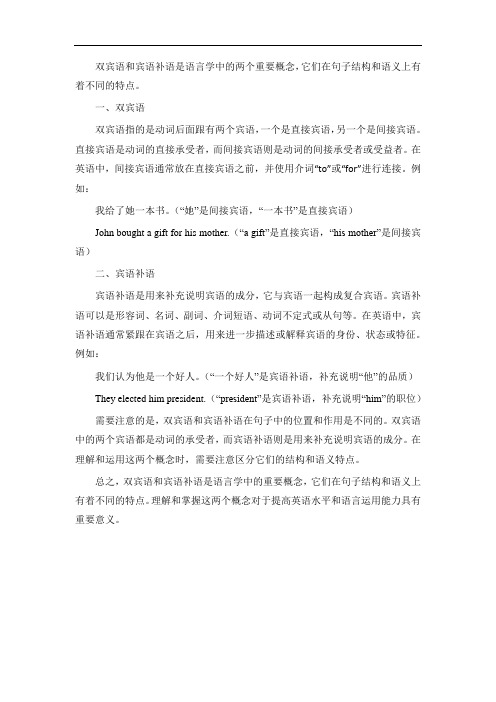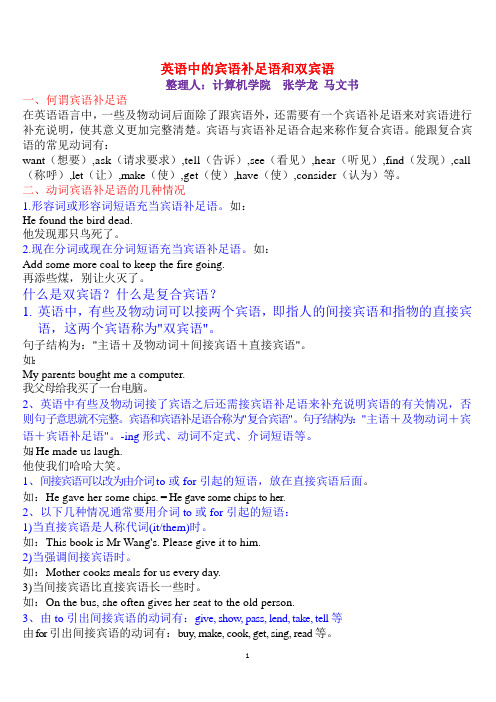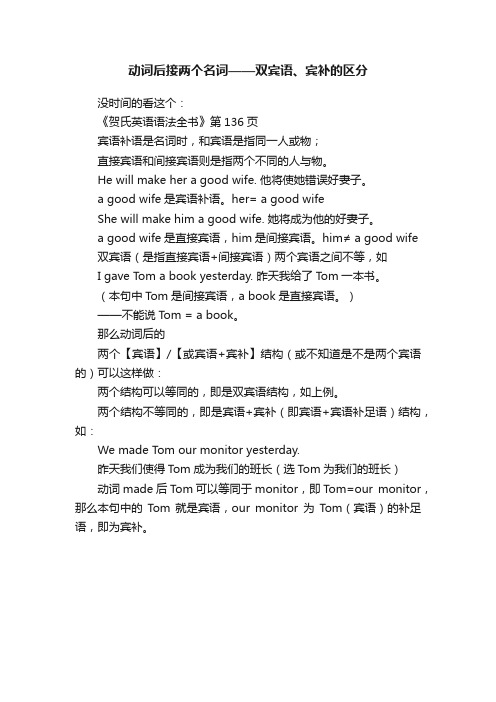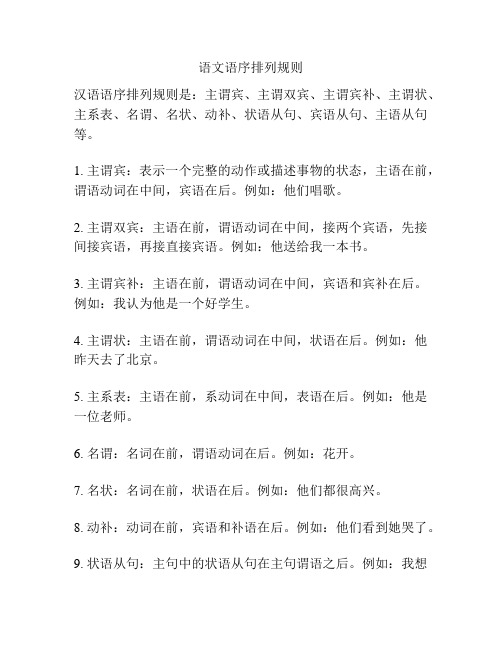表语 双宾 宾补
双宾语与宾补的区别

• We make Lijian our monitor. 〔名词〕 • 我们选李建为班长。 • He didn’t let me go.〔动词原形〕 • 他不让我走. • We must keep the classroom clean。〔形
容词〕
• 我们必须保持教室清洁. • English teacher asks me to keep quiet.〔动
=He gave a book to me
• 4. The boy wanted to ride his bicycle in the 动词+直接宾语+for+间接宾语
=She made coffer for us. He didn’t let me go.
street, but his mother told him ___. =He gave a book to me
词后加to〕 • 英语教师要求我们保持安静。
单项选择
• 1. Though he had often made his little
sister ____, today he was made ____ by Can you see________?
My parents bought me a computer.
what is he reading
his little sister. I found the door _____ when I got home.
not making
D.
双宾语与宾语补足语的区别
• cry; to cry B. crying; crying 其中间接宾语是指人的,直接宾语是指物的
do not to 双宾语与宾语补足语的区别
双宾语和宾语补语

双宾语和宾语补语是语言学中的两个重要概念,它们在句子结构和语义上有着不同的特点。
一、双宾语
双宾语指的是动词后面跟有两个宾语,一个是直接宾语,另一个是间接宾语。
直接宾语是动词的直接承受者,而间接宾语则是动词的间接承受者或受益者。
在英语中,间接宾语通常放在直接宾语之前,并使用介词“to”或“for”进行连接。
例如:
我给了她一本书。
(“她”是间接宾语,“一本书”是直接宾语)
John bought a gift for his mother.(“a gift”是直接宾语,“his mother”是间接宾语)
二、宾语补语
宾语补语是用来补充说明宾语的成分,它与宾语一起构成复合宾语。
宾语补语可以是形容词、名词、副词、介词短语、动词不定式或从句等。
在英语中,宾语补语通常紧跟在宾语之后,用来进一步描述或解释宾语的身份、状态或特征。
例如:
我们认为他是一个好人。
(“一个好人”是宾语补语,补充说明“他”的品质)They elected him president.(“president”是宾语补语,补充说明“him”的职位)需要注意的是,双宾语和宾语补语在句子中的位置和作用是不同的。
双宾语中的两个宾语都是动词的承受者,而宾语补语则是用来补充说明宾语的成分。
在理解和运用这两个概念时,需要注意区分它们的结构和语义特点。
总之,双宾语和宾语补语是语言学中的重要概念,它们在句子结构和语义上有着不同的特点。
理解和掌握这两个概念对于提高英语水平和语言运用能力具有重要意义。
在英语中什么是主语谓语宾语、状语、表语、定语、补语、宾补的位置

组成句子的各个部分叫句子成分。
英语句子成分有主语,谓语,表语,宾语,宾语补足语,定语,状语等。
顺序一般是主语,谓语,宾语,宾语补足语,而表语,定语,状语的位置要根据情况而定。
1、主语主语表示句子主要说明的人或事物,一般由名词,代词,数词,不定式等充当。
He likes watching TV.他喜欢看电视。
2、谓语谓语说明主语的动作,状态或特征。
一般可分为两类:1),简单谓语由动词(或短语动词)构成。
可以有不同的时态,语态和语气。
We study for the peo ple.我们为人民学习。
2),复合谓语:情态动词+不定式I can speakalit tleEng lish.我可以说一点英语。
3、表语表语是谓语的一部分,它位于系动词如be之后,说明主语身份,特征,属性或状态。
一般由名词,代词,形容词,副词,不定式,介词短语等充当。
My sister is a nurse.我姐姐是护士。
4、宾语宾语表示动作行为的对象,跟在及物动词之后,能作宾语的有名词,代词,数词,动词不定式等。
We like English.我们喜欢英语。
有些及物动词可以带两个宾语,往往一个指人,一个指物,指人的叫间接宾语,指物的叫直接宾语。
He gave me some ink.他给了我一点墨水。
有些及物动词的宾语后面还需要有一个补足语,意思才完整,宾语和它的补足语构成复合宾语。
如:We make him our monitor.我们选他当班长。
5、定语在句中修饰名词或代词的成分叫定语。
用作定语的主要是形容词,代词,数词,名词,副词,动词不定式,介词短语等。
形容词,代词,数词,名词等作定语时,通常放在被修饰的词前面。
He is a new student.他是个新生。
但副词,动词不定式,介词短语等作定语时,则放在被修饰的词之后。
The bike in the room is mine.房间里的自行车是我的。
6、状语修饰动词,形容词,副词以及全句的句子成分,叫做状语。
英语中的宾语补足语和双宾语

英语中的宾语补足语和双宾语整理人:计算机学院张学龙马文书一、何谓宾语补足语在英语语言中,一些及物动词后面除了跟宾语外,还需要有一个宾语补足语来对宾语进行补充说明,使其意义更加完整清楚。
宾语与宾语补足语合起来称作复合宾语。
能跟复合宾语的常见动词有:want(想要),ask(请求要求),tell(告诉),see(看见),hear(听见),find(发现),call (称呼),let(让),make(使),get(使),have(使),consider(认为)等。
二、动词宾语补足语的几种情况1.形容词或形容词短语充当宾语补足语。
如:He found the bird dead.他发现那只鸟死了。
2.现在分词或现在分词短语充当宾语补足语。
如:Add some more coal to keep the fire going.再添些煤,别让火灭了。
什么是双宾语?什么是复合宾语?1.英语中,有些及物动词可以接两个宾语,即指人的间接宾语和指物的直接宾语,这两个宾语称为"双宾语"。
句子结构为:"主语+及物动词+间接宾语+直接宾语"。
如:My parents bought me a computer.我父母给我买了一台电脑。
2、英语中有些及物动词接了宾语之后还需接宾语补足语来补充说明宾语的有关情况,否则句子意思就不完整。
宾语和宾语补足语合称为"复合宾语"。
句子结构为:"主语+及物动词+宾语+宾语补足语"。
-ing形式、动词不定式、介词短语等。
如:He made us laugh.他使我们哈哈大笑。
1、间接宾语可以改为由介词to或for引起的短语,放在直接宾语后面。
如:He gave her some chips. = He gave some chips to her.2、以下几种情况通常要用介词to或for引起的短语:1)当直接宾语是人称代词(it/them)时。
表语、双宾、宾补

• 5)变化系动词(become, grow, turn, fall, get, go, come, run) • He became mad after that. 自那之后,他疯了。 • She grew rich within a short time. 她没多长时间就 富了。 • The tree turned green. 树儿变绿了! • 固定搭配:come true, fall asleep, fall ill, go bad • 6)终止系动词(prove, turn out, “证实”,“变 成” ) • The rumor proved (to be) false. • 这谣言证实有假。 • His plan turned out (to be) a success. • 他的计划终于成功了。
表语、双宾、宾补
表语(系动词的兄弟) ——说明主语的状况、性质、特征等情况。
• • • • • 1)状态系动词(只有be一词) He is a teacher. 他是一名教师。 He is ill. 他病了。 2)持续系动词(keep, remain, stay, lie, stand) He always kept silent at meeting. 他开会时总保持 沉默。 • This matter remains a mystery. 此事仍是一个谜。 • I stayed awake all night thinking of them. 我心里想着他们,彻夜未眠。 • He stood still there.他站在那里一动不动。
• 1. Though he had often made his little sister ____, today he was made ____ by his little sister. • A. cry; to cry B. crying; crying C. cry; cry D. to cry; cry • 2. They would not allow him _____ across the enemy line. • A. to risk going • C. for risk to go • A. opened B. close B. risking to go D. risk going C. unlocking D. open
动词后接两个名词——双宾语、宾补的区分

动词后接两个名词——双宾语、宾补的区分没时间的看这个:《贺氏英语语法全书》第136页宾语补语是名词时,和宾语是指同一人或物;直接宾语和间接宾语则是指两个不同的人与物。
He will make her a good wife. 他将使她错误好妻子。
a good wife是宾语补语。
her= a good wifeShe will make him a good wife. 她将成为他的好妻子。
a good wife是直接宾语,him是间接宾语。
him≠ a good wife双宾语(是指直接宾语+间接宾语)两个宾语之间不等,如I gave Tom a book yesterday. 昨天我给了Tom一本书。
(本句中Tom是间接宾语,a book是直接宾语。
)——不能说T om = a book。
那么动词后的两个【宾语】/【或宾语+宾补】结构(或不知道是不是两个宾语的)可以这样做:两个结构可以等同的,即是双宾语结构,如上例。
两个结构不等同的,即是宾语+宾补(即宾语+宾语补足语)结构,如:We made Tom our monitor yesterday.昨天我们使得Tom成为我们的班长(选Tom为我们的班长)动词made后Tom可以等同于monitor,即Tom=our monitor,那么本句中的Tom就是宾语,our monitor为Tom(宾语)的补足语,即为宾补。
有时间的往下看:我们知道,宾语的补语简称为“宾补”,通常由1名词(名词短语)、2形容词(短语)、3不定式/动词原形(短语)、4分词(doing, done)(短语)、5介词短语、6副词等充当,说明宾语的状态、性质或说明宾语的特征,对宾语起到修饰的作用,从而使得动词的含义得以体现。
动词make在“使成为、培养成为”含义时,结构是make +宾语+补语,如:The party had made her a staunch commuist.当把她培养成为坚强的共产主义者。
语文语序排列规则

语文语序排列规则
汉语语序排列规则是:主谓宾、主谓双宾、主谓宾补、主谓状、主系表、名谓、名状、动补、状语从句、宾语从句、主语从句等。
1. 主谓宾:表示一个完整的动作或描述事物的状态,主语在前,谓语动词在中间,宾语在后。
例如:他们唱歌。
2. 主谓双宾:主语在前,谓语动词在中间,接两个宾语,先接间接宾语,再接直接宾语。
例如:他送给我一本书。
3. 主谓宾补:主语在前,谓语动词在中间,宾语和宾补在后。
例如:我认为他是一个好学生。
4. 主谓状:主语在前,谓语动词在中间,状语在后。
例如:他昨天去了北京。
5. 主系表:主语在前,系动词在中间,表语在后。
例如:他是一位老师。
6. 名谓:名词在前,谓语动词在后。
例如:花开。
7. 名状:名词在前,状语在后。
例如:他们都很高兴。
8. 动补:动词在前,宾语和补语在后。
例如:他们看到她哭了。
9. 状语从句:主句中的状语从句在主句谓语之后。
例如:我想
去你说的那个地方。
10. 宾语从句:主句中的宾语从句在主句的谓语动词之后。
例如:我知道他去了哪里。
11. 主语从句:主语从句放在句首作主语。
例如:结婚能不能幸福,取决于双方的努力。
请注意,这只是一些基本的语序排列规则,实际上汉语的语序是非固定的,可以根据需要进行灵活调整。
基础知识 双宾语和宾语补足语 讲义 高三英语上学期一轮复习专项

基础知识:双宾语和宾语补足语双宾语:就是有两个宾语,一个是直接宾语(direct object),一个是间接宾语(indirect object)。
直接宾语的例子:Sasha paints landscapes.The kindergarteners prefer shortstories over poetry.Europe welcomed millions of tourists last year.我们可以看到红色的宾语,都是谓语动词这个“动作”的承受者。
1,画风景画2,更喜欢短故事3,欢迎游客所以直接宾语就是谓语动词的承受者。
间接宾语的例子:Martin read Maria a book.Stan built Julie ahouse.John threw Steve a ball.根据直接宾语的例子,我们知道直接宾语是谓语动词的承受者,那么我们就能看出名词book,house,ball都是直接宾语。
1,Martin读书给Maria2,Stan盖房子给Julie3,John扔球给Steve间接宾语是Maria,Julie,Steve,是直接宾语的对象,to whom/what或者for whom/what如:Martin read a book to Maria.He made me a cake.=He made a cake for me.这样就能看出直接宾语是紧跟在谓语后面的。
宾语补足语(object complement)宾补是指跟在直接宾语后面,对直接宾语进行说明,补充说明宾语的状态。
宾语是名词或者代词,但是宾补可以是形容词、副词、动词、名词、不定式、分词、介宾短语等。
例:Chocolate makes Tanya happy.She just called me a singer.I found Joyce working.我们可以发现宾语后面如果没有词的话,那么这句话就不完整1,巧克力让Tanya,怎么了,没有说明2,她刚刚叫我,叫我干什么,也没有说明3,我发现Joyce,倒是可以,但是明显没有把说话人的意图表示清楚所以宾补的作用就是要补充、说明1,Chocolate makes Tanya happy. Tanya和happy之间有逻辑关系,即:Tanya is happy.2,Shecalled me a singer. me和singer的逻辑关系是I am a singer.3,I found Joyce working.Joyce和working的逻辑关系是Joyce is working.例:1.The panel judges named her this year’s winner for best performance. (名词短语)2.They caught little Jessica red-handed reaching into the cookie jar at midnight.(形容词短语)3.Both critics and moviegoers declared the film a flop and thewriting a disaster. (名词)4.“They called the movie what?” said the director.(代词)5.The letter you wrote made me joyful. (形容词)6.He worked on the model until he felt he had made it perfect.7.After reviewing the details of the case, the court pronounced the boy not guilty.as和as being后面跟补语动词+宾语+as (being) +补语asI think of the government as useless.She declared the dish as delicious as a five-star meal.The judges regard him as worthy of the prize.He described his wife as loyal, loving and faithful.as beingHe sees the car as being a classic beauty.They consider him as being a very smart person.She sees him as being emotionally draining.The teacher regards him as being disruptive in class.宾语补足语和主语补足语宾补:是对宾语的补充主补:是对主语的补充宾补与宾语在逻辑上有主谓关系如:You should keep the window open.open是对宾语window的补充the window is open是逻辑上的主谓关系主补与主语也有逻辑上的主谓关系如:The window should be kept open.She was elected chairman of Students’ Union.把这句写成主动语态:We elected her chairman of Students’ Union从上面的例句看出,主补通常在被动语态中,宾语变主语,宾补变主补。
- 1、下载文档前请自行甄别文档内容的完整性,平台不提供额外的编辑、内容补充、找答案等附加服务。
- 2、"仅部分预览"的文档,不可在线预览部分如存在完整性等问题,可反馈申请退款(可完整预览的文档不适用该条件!)。
- 3、如文档侵犯您的权益,请联系客服反馈,我们会尽快为您处理(人工客服工作时间:9:00-18:30)。
• 1. Though he had often made his little sister ____, today he was made ____ by his little sister.
• A. cry; to cry B. crying; crying C. cry; cry D. to cry; cry
• He looks tired. 他看起来很累。 • He seems (to be) very sad. 他看起来很伤心。 • He appeared very happy. 他看起来很开心。 • 4)感官系动词(feel, smell, sound, taste) • This kind of cloth feels very soft. 这种布手感很软。 • This flower smells very sweet. 这朵花闻起来很香。 • The idea sounds good. 这主意听起来不错哦! • The snake meat tastes delicious. 这蛇肉好吃极了!
• 然后把一块乳酪装进衣袋里走了。
• Then he put a piece of cheese in his pocket and went away.
• 后来,一位邻居告诉了我他的情况。
• Later a neighbor told me about him. • 大家都认识他,他叫珀西.巴顿斯。
• 2. They would not allow him _____ across the enemy line.
• A. to risk going
B. risking to go
• C. for risk to go
D. risk going
• 3. I found the door _____ when I got home.
• A. beat B. to be beating C. beating D. was beating
• 6. You had better get a doctor _____ your bad tooth.
• A. pull out
B. to pull out
• C. pulled out
D. pulling out
• 我刚刚搬进了大桥街的一所房子。昨天一 个乞丐来敲我的门,问我要一顿饭和一杯啤 酒。作为回报,那乞丐头顶地倒立起来,嘴 里还唱着歌。我给了他一顿饭。他把食物吃 完,又喝了酒。然后把一块乳酪装进衣袋里 走了。后来,一位邻居告诉了我他的情况。 大家都认识他,他叫珀西.巴顿斯Percy Buttons
• 作为回报,那乞丐头顶地倒立起来,嘴里还唱着 歌。
• In return for this, the beggar stood on his head and sang songs.
• 我给了他一顿饭。 • I gave him a meal. • 他把食物吃完,又喝了酒。 • He ate the food and drank the beer
• 。他每月对这条街上的每户人家光顾一次, 总是请求给他一顿饭和一杯啤酒。
• 我刚刚搬进了大桥街的一所房子。 • I have just moved to a house in Bridge Street. • 昨天一个乞丐来敲我的门,问我要一顿饭和一杯
啤酒。
• Yesterday a beggar knocked at my door. He asked me for a meal and a glass of beer.
• 5)变化系动词(become, grow, turn, fall, get, go, come, run)
• He became mad after that. 自那之后,他疯了。 • She grew rich within a short time. 她没多长时间就
富了。
• The tree turned green. 树儿变绿了! • 固定搭配:come true, fall asleep, fall ill, go bad • 6)终止系动词(prove, turn out, “证实”,“变
• Everybody knows him. His name is Percy Buttons
• 他每月对这条街上的每户人家光顾一次,总是请 求给他一顿饭和一杯啤酒。
• He calls at every house in the street once a month and always asks for a meal and a glass of beer.
• 7. His remarks left me _____ about his real purpose.
• A. wondered B. wonder C. to wonder D. wondering
• 8. When I caught him ______ me I stopped buying things there and started dealing with another shop.
宾语补足语(动词+宾语+宾补)
• ask, want, beg, invite, force, get, expect, order, cause, teach, tell, persuade, wish, allow, advise, encourage, urge + sb. to do sth.
练一练
• 1. He paid the shopkeeper some money. • 2. He handed me the prize. • 3. The waiter brought a bottle of beer to the man. • 4. He sold all his books to me. • 5. The shop assistant found some curtain material
成” )
• The rumor proved (to be) false. • 这谣言证实有假。
• His plan turned out (to be) a success. • 他的计划终于成功了。
练一练
• 1. 我们遇到(come across)危险时一定要保持冷静(stay)。 • We must stay calm when we come across danger. • 2. 他的计划证实是失败的(failure)。 • His plan proved / turned out to be a failure. • 3. 他的脸摸起来很粗糙(rough)。 • His face feels very rough. • 4. 他已经五十岁了,但看起来很年轻(appear)。 • He is 50, but he apears very young. • 5. 秋天一到,天气就会变得越来越凉了(get)。 • It will get cooler and cooler when autumn comes.
表语、双宾、宾补
表语(系动词的兄弟) ——说明主语的状况、性质、特征等情况。
• 1)状态系动词(只有be一词) • He is a teacher. 他是一名教师。 • He is ill. 他病了。 • 2)持续系动词(keep, remain, stay, lie, stand) • He always kept silent at meeting. 他开会时总保持
for me. • 6. He did me a big favor. • 7. She showed her husband her new hat. • 8. She promised a reward to the finder. • 9. He gave his son some advice.
• A. cheating B. cheat C. to cheat D. to be cheating
• 9. It’s so cold today, we must keep the fire ________.
• A. to burn B. burning C. burn D. burnt
Homework:在以下五组词中,每组 词任选一个造句
沉默。 • This matter remains a mystery. 此事仍是一个谜。
• I stayed awake all night thinking of them. 我心里想着他们,彻夜未眠。
• He stood still there.他站在那里一动不动。
• 3)表像系动词(用来表示"看起来像"这一概念, 主要有seem, appear, look)
• 10. His uncle left him some money. • 11. He is teaching English to us. • 12. I bought this bunch of flowers for you. • 13. Bring that book to me please. • 14. He offered me a cigarette. • 15. Read me the first photograph. • 16. I’ve ordered some soup for you. • 17. I owe him a lot of money. • 18. Pass the mustard to your father.
双宾语(动词+sb+sth)
• He lent me a book. 他借了本书给我。 • = He lent a book to me. • He sent me a card. 他寄了张卡给我。 • = He sent a card to me. • He passed me the salt. 他把盐递给了我。 • =He passed the salt to me. • She bought me a tie. 她为我买了一条领带。 • = He bought a tie for me. • She made me a cake.她为我做了一个蛋糕。 • =She made a cake for me.
